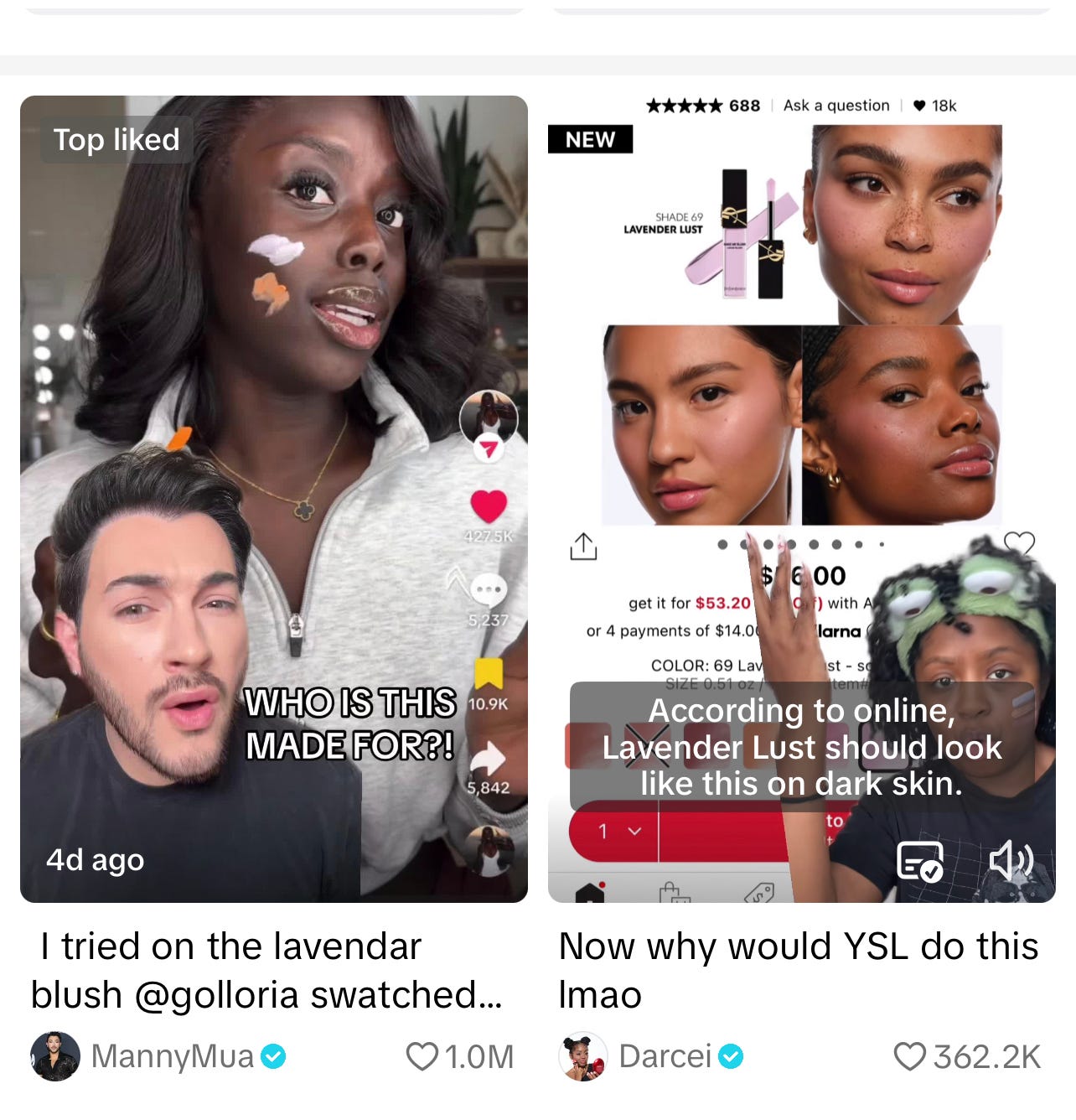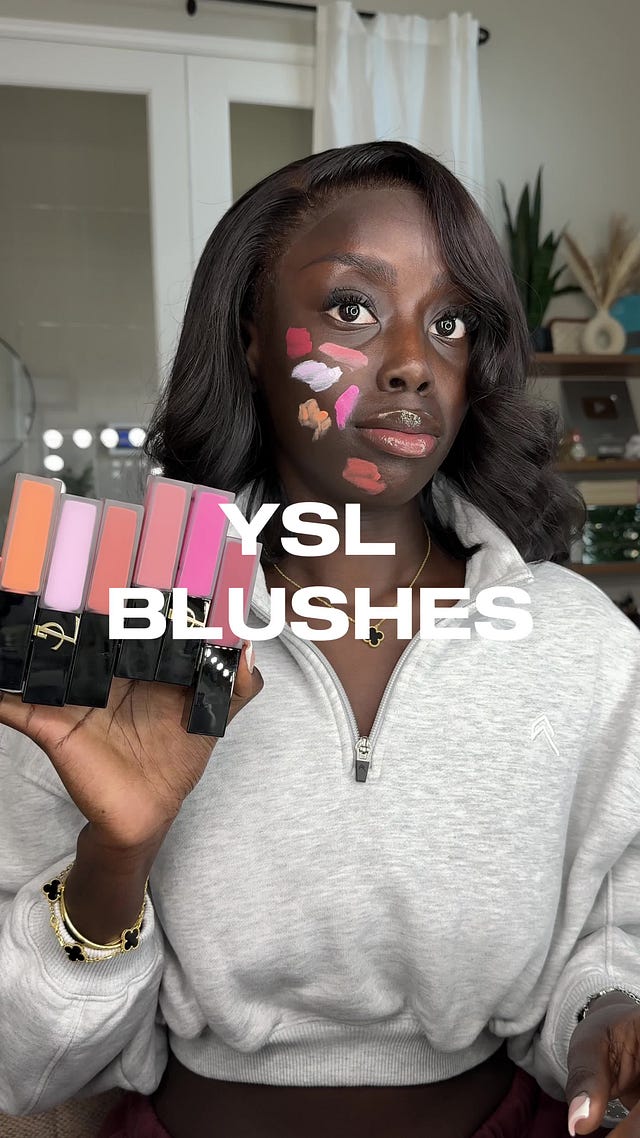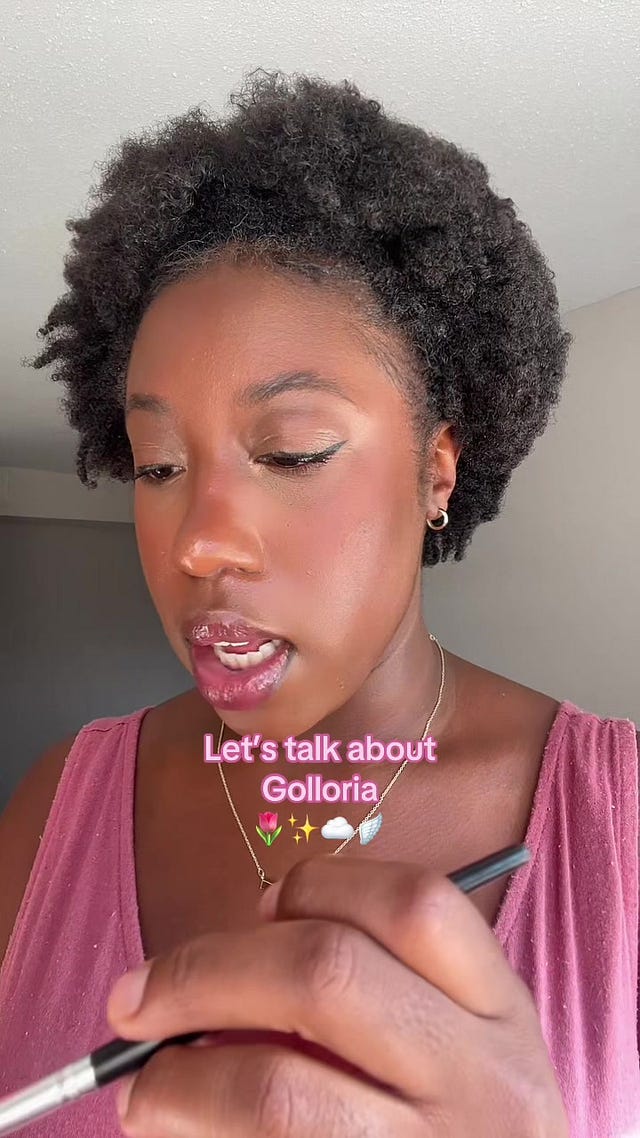The Illusion of Inclusivity: Why Does the Beauty Industry Continue to Fail Black Women?
YSL Blushes, Golloria and Racist Hate
When YSL launched their new Make Me Blush liquid blushes, I doubt this was the response they anticipated - especially with the pale lavender shade. In the campaign images on the Sephora website, the blush is shown on a model with darker skin, where it appears like a lovely blush that works well on darker complexions, it’s marketed as such. As someone with a darker skin tone, I wouldn’t think twice about finalising that purchase - I may have a serious case of blush blindness, it doesn’t take much to convince me when it comes to blush. However, reality proved to be quite different. Content creator Gloria (@golloria) was among those who tested it, and when she tried it on her deeper complexion, the result wasn’t exactly the same. Instead of a vibrant, flattering hue, the blush, well let’s just say wasn’t blushing. The majority of the shades were formulated with a white base and thus on majority of darker skin tones it will look super ashy.
 Tiktok failed to load.
Tiktok failed to load.Enable 3rd party cookies or use another browser
The outrage wasn’t just about the product not working - it was about misleading marketing. But as is too often the case, the conversation took a toxic turn. Gloria found herself on the receiving end of a HUGE wave of racist abuse, it got so bad that she’s taking time off essentially her work.
Gloria and other Black beauty content creators are not demanding that every beauty product be tailored to them; they’re asking for brands for authentic inclusivity. In this case, the marketing was clearly misleading. This incident raises critical questions about the beauty industry’s approach to inclusivity, particularly for Black women. As brands continue to make surface-level efforts to appear diverse, they often fail to follow through with products that genuinely meet the needs of darker-skinned consumers.
And often these efforts can sometimes feel disingenuous or exploitative? What do you think?
The beauty industry has long had a problem when it comes to truly serving Black women. Despite the progress made with brands like Fenty Beauty setting a new standard for inclusivity, most brands still prioritise lighter skin tones. A quick stroll down the beauty aisle in many drugstores reveals the stark reality: shelves lined with shades for white or lighter-skinned consumers, while deeper shades are an afterthought or missing altogether. And even luxury brands, which might offer a few darker shades in their foundations, often don’t extend that inclusivity to blushes, bronzers, and highlighters.
 Tiktok failed to load.
Tiktok failed to load.Enable 3rd party cookies or use another browser
A 2021 report by McKinsey & Company found that Black consumers spend over $6.6 billion on beauty products each year. Yet, only 4-7% of beauty products in major retailers are designed for darker skin tones. Despite increased focus on inclusivity in marketing campaigns, brands often fail to provide products that live up to those claims. So, when a product like YSL’s lavender blush is marketed as universal but doesn’t deliver, it feels less like a simple beauty mishap and more like another instance of a brand making empty promises.
Misleading marketing taps into the concept of expectancy theory, which suggests that people are motivated to act in certain ways based on their expectations of positive outcomes. When Black women see products marketed to them with promises of inclusivity, they expect those products to deliver. When reality falls short, the disappointment is magnified—not just because the product didn't work, but because it feels like another instance where Black consumers are being marginalised or ignored.
The backlash against Gloria also reflects a broader societal issue: when Black women speak out about their dissatisfaction, they’re often met with hostility. Gloria’s criticism of the product, which was legitimate and based on personal experience, was drowned out by racist comments accusing her of being overly sensitive or of creating an issue where there wasn’t one. This type of response is deeply harmful and plays into a larger pattern of racial gaslighting, where Black people are told that their experiences of racism aren’t real or valid.
In beauty spaces, this dynamic can be particularly toxic. Black women have to fight not only to find products that work for them, but also to defend their right to be heard when those products fail. In her book We Should All Be feminist, author Chimamanda Ngozi Adichie says "The problem with gender is that it prescribes how we should be rather than recognising how we are." The same can be said for race in the beauty industry: rather than accepting that beauty is diverse and creating products accordingly, brands still prescribe Eurocentric standards of beauty and make only superficial gestures toward inclusivity.
Inclusivity isn’t just about marketing—it’s about the actual products. Many brands still fail to understand the needs of Black women, even as they use them to sell an image of diversity. Yes, many brands have expanded their foundation ranges, but as Gloria’s and that of many many Black and Brown women experiences show, there’s still a long way to go when it comes to blush, eyeshadows, and other colour cosmetics.
A recent Mintel report showed that 60% of Black women in the U.S. still feel underrepresented in beauty advertising. And when brands like YSL do attempt to be inclusive, they often miss the mark—either by failing to create products that actually work for darker skin tones or by relying on misleading marketing to suggest they’re doing more than they are.
While on the surface level, this may seem like nothing more than outrage over blush, it’s part of a larger conversation about race, inclusion, and the way Black women are treated both in beauty spaces and beyond.
The beauty industry has the power to influence culture and identity. By continuing to cater primarily to a narrow group of consumers, it perpetuates a narrow definition of beauty that excludes large swaths of the population. Real inclusivity means more than checking off a diversity box in a campaign - it means fundamentally shifting the way the industry operates, from the lab to the shelf to marketing to customer experience. Until that happens, Black women should have the right to call out the illusion of inclusivity without backlash. Rant on!








Its literally false advertising, and the gaslighting and racial abuse that followed when Gloria was talking about her own experience is disgusting but not shocking. Gloria obviously wasn't being sensitive. People are sensitive to black women's opinions - especially those that aren't complimentary or positive.